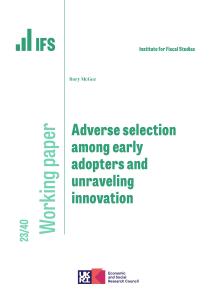Random utility models are widely used to study consumer choice. The vast majority of applications assume utility is linear in consumption of the outside good, which imposes that total expenditure on the subset of goods of interest does not affect demand for inside goods and restricts demand curvature and passthrough. We show that relaxing these restrictions can be important, particularly if one is interested in the distributional effects of a policy change, even in a market for a small budget share product category. We consider the use of tax policy to lower fat consumption and show that a specific (per unit) tax results in larger reductions than an ad valorem tax, but at greater cost to consumers.
Authors

CPP Co-Director, IFS Research Director
Rachel is Research Director and Professor at the University of Manchester. She was made a Dame for services to economic policy and education in 2021.

cemmap co-Director University College London
Lars Nesheim is a Professor of Economics at UCL and Co-Director of the Centre for Microdata Methods and Practice (cemmap).

Research Fellow University of Wisconsin
Martin, previously Deputy Research Director, is a Research Fellow at IFS and Professor of Economics at the University of Wisconsin.
Journal article details
- DOI
- 10.3982/QE583
- Publisher
- Wiley
- Issue
- November 2017
Suggested citation
R, Griffith and L, Nesheim and M, O'Connell. (2017). 'Income effects and the welfare consequences of tax in differentiated product oligopoly' (2017)
Grant
More from IFS
Understand this issue

Election Special: Your questions answered
27 June 2024

Election Special: The big issues politicians haven't spoken about
25 June 2024

Election Special: The Labour manifesto explained
14 June 2024
Policy analysis

How would the parties’ tax and spending plans affect Scotland and Wales?
28 June 2024

What are the parties’ plans for benefits and taxes?
24 June 2024

Plaid Cymru manifesto: a response
13 June 2024
Academic research

Saving by buying ahead: stockpiling in response to lump-sum payments
2 February 2024

Intertemporal income shifting and the taxation of business owner-managers
24 January 2024

Adverse selection among early adopters and unraveling innovation
18 December 2023